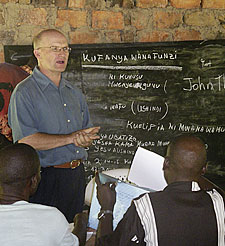Sydney Anglicans have been sending missionaries and money to developing nations for over 100 years. But are we spending our resources wisely? Do our giving and sending strategies reflect the needs of developing countries?
 Our money may be better spent funding theological colleges in developing countries, rather than sending our own missionaries, according to Stuart Brooking, executive director, Overseas Council Australia.
Our money may be better spent funding theological colleges in developing countries, rather than sending our own missionaries, according to Stuart Brooking, executive director, Overseas Council Australia.
"By comparison with the strategy of funding Western missionaries, funding nationals to train in their own environment is far more cost-effective," he says in his article, "Investing for the future" featured in the June issue of Southern Cross.
"Depending on the country, five to 30 nationals can be trained for the cost of one Western missionary," he adds.
Stuart asserts that local missionaries, who are familiar with their culture and language, can often minister in their neighbourhood for 30 to 40 years. What's more, their ministry costs - once they are trained - can generally be covered by their local parishes.
The people perspective
John Thew, federal secretary of CMS-Australia, believes this view to be "simplistic", as the needs of developing nations extend beyond money.
"Wherever I go, almost anywhere, church leaders say, "the thing we need most is people " people who are well-trained, humble with a servant attitude and who are willing to come here and live with us'," he says.
While he admits that a people-sending organisation is likely to receive such comments, he feels this common response reveals the need for well-trained theology teachers, who can also be a godly example.
He says Sydney is in an ideal position to send people because of our wealth in training and knowledge.
"The Sydney Diocese's cup is overflowing with people who are well-trained," he says.
"People overseas are telling me, "you have this huge wealth of teaching and education " please pour it out’,"
However Stuart says that, while missionaries still play a role, mission organisations may not be considering the option of sending money instead.
"This is not an absolute statement, but it's something mission organisations need to think more about," he says.
"50 to 200 years ago there was an enormous need for missionaries. It worked: churches are viable, colleges are functioning, but I think the actual stage the church is at is very different now."
Stuart says mission organisations need to consider building more on the enthusiasm and resources of local churches.
"The need is increasingly to assist the nationals in their leadership ability rather than the west providing leadership."
However he says this strategy works best in areas where infrastructure is already in place.
"It applies most to where people do grassroots evangelism, and where there is a vibrant church in the country."
Getting the parish on board
Andrew Eatough, chairman of the mission committee at St Thomas' North Sydney, says supporting OCA along with CMS gives the church a more well-rounded perspective on mission.
"We've got to focus on training indigenous people in each country," he says. "And the dollar goes further (with OCA)."
But he adds that actively sending missionaries through organisations like CMS makes it easier for the church to have ownership of the mission initiatives they support.
"It's a more traditional paradigm that people relate to."
Addressing the brain drain
Training leaders at theological colleges in their own country could prevent what Stuart calls "a systematic pillaging of a church which is desperate for leaders and least able to afford losing them."
According to Stuart, this "brain drain" happens when students from the developing world leave their countries to study in Western colleges " and often take up ministry opportunities elsewhere.
"The return rate to the home country typically is less than half and when the student does return, their learning is from such a different context that it takes years to readjust, or after a time they merely return to the West."
Taking training home
Pato and Dagmar Oyarzún studied at Moore College for five years on a scholarship offered to their home diocese of Chile.
They were also sponsored by CMS and continue to be one of 60 CMS bursars around the globe.
They say the benefits of their time here extended beyond "excellent Bible teaching" and "great lecturers" to "so many examples of godly living".
However since they have returned they have had some difficulty settling back into Chilean culture church life.
"It is hard to go back to a place where everybody expects you to understand the way of doing things, when after five years these things are not familiar any more."
"We have become older (and wiser" we hope!) so we are different and the people here are different, but they can't see their changes, but ours."
Nonetheless, the Oyarzuns say their studies in Sydney have been a blessing and are giving them multiple opportunities to minister in Chile.
"We can see how much we can serve here and how much help we need" we have been so blessed that we feel we would like to say "yes' to every opportunity to preach, meet with people, teach a course, begin a Bible Study group, but we need to hold on very tight to God's hand and look after our little family as well."





















